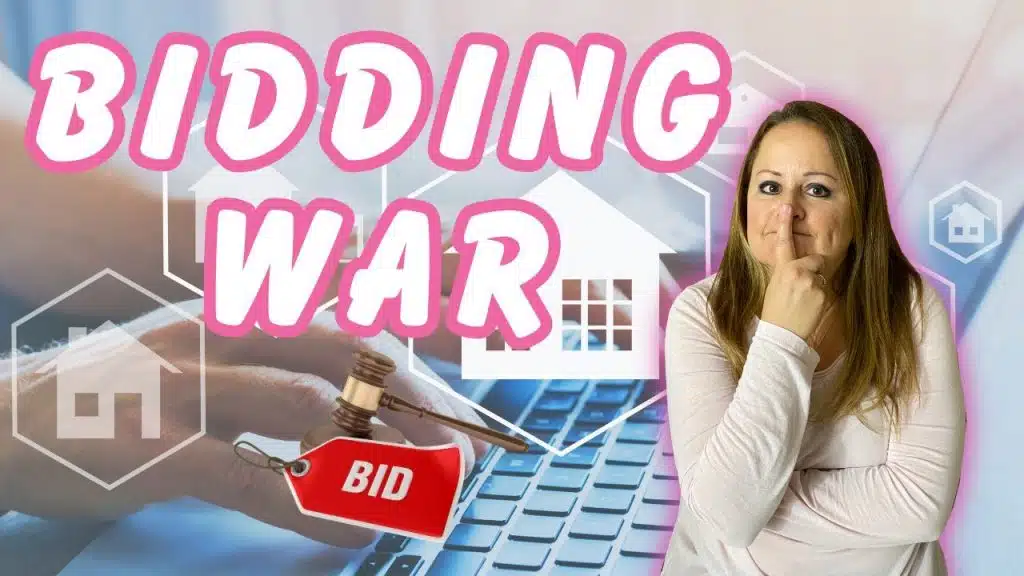Increase Your Chances In A Bidding War
Are you sick of having to bid over and over again in a hot market, only to get outbid on your dream home? In this video, we’re going to talk about 10 ways to increase your chances of winning in a multiple offer situation in a hot real estate market. I’ll break down each tip so you know exactly how to increase the odds of getting the house you want.
1. Waiving Inspections
Let’s start with the standard stuff when you’re in a multiple offer or a competitive situation—which, right now in the middle of COVID, none of us would have expected. We’re in one of the hottest real estate markets we’ve seen since pre-2008 bubble.
One of the standard things you can do is waive your home and other inspections. Does this mean that you have to buy a house that could potentially be a money pit? Not really. You can still do an inspection, you just do it before you write your offer. This seems to be a DC-thing right now, so listen up if you’re in another market. If you’re able to do this, you may get a competitive edge by doing the inspection before you write your offer.
Sometimes inspectors do a “walk and talk” where they just walk around the house with you tell you about what problems they see. They’ll also check the dates on all of the major appliances and other big ticket items, and you take notes along the way. They don’t write up a report though, and in exchange for not writing a report they also cut the price of a normal inspection.
Regardless, one or both of these options may be available to you in your market and might be worth checking out.
I’ve talked to real estate friends in other cities and they say this is unheard of. A seller doesn’t let anybody into their house to do a home inspection before writing an offer. Well, here are a couple of reasons why they may want to consider it.
First of all, they get all these inspections out of the way. In this specific market, you end up doing the inspection and writing an offer, though the offer is not subject to an inspection. Nothing ever gets disclosed to the seller. So sellers are kind of loving it and they’re sitting pretty on this. I just had a listing that went under contract this evening and there were five pre-offer inspections. All five of those people went on to make offers on the property and waived their inspection.
There are other options here. You can also do an inspection. In some markets, this may be an option where you’re not going to negotiate, but it’s a right to cancel only. And if you cancel only, all you’re doing is saying that once the offer gets ratified, you’re going to do a home inspection—but you’re not going to ask the seller to fix anything.
Customary with our contract language here in the DC area, it also says that to do this cancel only, you’re not providing the seller any type of report. The seller doesn’t end up getting this report that they then have to turn around and disclose to any other buyers.
2. Waiving The Appraisal
The second way you can win in a bidding war is to waive the appraisal. I know this also sounds scary. Waiving an appraisal is essentially telling the seller that you may be paying beyond what an appraiser deems is the market value for the property. It also says that you’re okay with that, and you have the cash to bridge the gap.
Let’s do some simple math. Imagine a property is $500,000. You waive your appraisal, get your offer accepted, and the appraisal comes in at $450,000. If you’re going to put 80% to the loan and put 20% down, you can still buy the property. It’s just that the lender is only going to give you a loan for 80% of the appraised amount—in our example, 80% of $450,000.
This means you’d have to cover the 20% down on the $450,000, which is $90,000. You’ll also need to bring an additional $50,000 to closing to bridge you from the $450,000 appraised value to the $500,000 contract price. Some people that are flush with cash can do this, and we’ve been seeing this almost universally across the DC area with contracts. The one caveat to this is that in some jurisdictions, even locally, the appraisal is essentially wrapped in with the financing. So if you’re declaring specified financing—that the buyer is going to get x amount of a loan—and they don’t get it, they suddenly also don’t qualify for the specified financing.
It’s a toss-up whether you even need an appraisal contingency. What it does is it reserves the right for you to go back to the seller and do some negotiations on price. If you waive it, you can’t negotiate on price. And in this area, you can also (by contract language) get out if you don’t qualify for the specified financing.
3. Waiving Your Financing
Another option to secure your offer is to waive your financing. What we’ve seen with some lenders, especially our local ones, is that they’re able to pre-underwrite buyers. All that it’s subject to, once they’ve pre-underwritten a buyer, is a ratified contract, a satisfactory appraisal, and the buyer meeting the conditions. Then they’re approved.
Instead of having a buyer fill out an application and running their credit, they’re providing all their documents. This is very, very important. You want to be able to have people that have been fully vetted and gone through the process.
4. Escalation
The fourth way to secure your bid is the dreaded escalation. So, you put in a cap on escalation. I always tell people that an escalation is like eBay. It really bids against you and the other offers for you when you’re in the middle of a negotiation.
For example, let’s say the contract price of a house is $500,000. You may be willing to pay up to $550,000. So, you put in your price at $500,000 and escalate to $550,000, determining what increment you’re going to escalate in. However, don’t do it in $1,000s. If one offer goes to $535,000 but they are closing a week sooner—and you’re going up by $1,000 increments—you would get the property technically for $536,000. If you’re closing later, that may not even be worth it to the seller.
So don’t do that. Rather, put it in a nice big jump to get you far away from the offer that you’re going to be competing with. You want them to say, “hey, look, I’m going with these people. They may be settling a week or two later, but they’re giving me $10,000 extra.”
5. Renting Back to the Seller
To amp up the chances of your offer getting accepted, you should give the seller overlap time. Right now some sellers may be selling a house and moving on to another house. However, they need some overlap time because they need the funds from this house to close and to satisfactorily make it to the next place where they can buy that house.
I’m seeing many sellers that are saying we’re fine with closing in March, but we need to rent back until April. You’re allowed to do a rent back up to 60 days without being considered a landlord, having to do a whole investment loan, and changing your interest rate.
As long as you are okay with this, and you can make this work, this is something that you should consider offering the seller. It’s such a peace of mind for them to not have to think about where they are going to go or if they have to put stuff in storage.
6. Other Perks
I’ve seen all kinds of crazy things happening in the beginning of COVID. When sellers were interested in getting offers for their houses and attempting to convince people to buy, buyers were also attempting to get into houses that they wanted.
I was seeing a lot of people offer time in their vacation homes to buyers. I saw one at the beginning of COVID where the sellers were offering to send the buyer for two weeks to their Airbnb condo in Italy, while they continued to rent back in their current house. You may not remember the beginning of COVID, but Italy was a giant hotspot. So when I was told about this little perk, I laughed, but some perks might be so completely appealing that you may be able to toss them in as part of the deal.
If you have a vacation home or access to something that somebody wouldn’t normally have that you could get them, you may want to make that part of the offer.
7. Send Letters
While this is a little bit more reconnaissance work, sending letters to your desired area is a great way to stand out among other offers. For example, let’s say you’ve identified an area where you really want to live. You can send letters to that neighborhood or subdivision. As an agent, I’ve done this multiple times for clients in multiple different neighborhoods, attempting to find somebody who may be willing to sell.
If you have an astute seller or owner of a house that gets a postcard or letter, you may get a leg up on the competition. I send postcards as I don’t want anybody to open a letter. Why? I don’t want to allow them to say, “this is going to take more time.” I give them a bright postcard, and it screams: I have clients and this is what they are looking for.
8. Make An Offer Sight Unseen
I’ve had clients do this recently: make an offer sight unseen. This has been happening more and more, especially with COVID, as people are relocating from one city to another. I know this is scary, but I’ve had several people buy houses sight unseen.
What they’ve been able to do is see houses in the same subdivision, understand the floor plan, and then look at pictures to try to figure out exactly what might be different about this house. If you’re comfortable with this it can work great. I had clients that just went a tiny bit over the asking price and wrote an offer site unseen before the property hit the market—when it was still in the “coming soon” status. The sellers just accepted it and decided it was fine.
My clients didn’t have contingencies other than just a quick little home inspection. The sellers thought they had no risk, so they just went ahead and took the offer while still going to market with it. If somebody else wants to write an offer, they can if needed.
9. Submitting a Letter With Your Offer
I generally believe that you should not write a letter to the seller in your offer. Don’t tell them how you rescued poor animals in China from turning into fur coats, how you saved all the children, how you build houses for Habitat for Humanity. I think that for most sellers, it’s not emotional. It’s about the money. It’s about price and terms.
I think that if a seller feels in any way that they are being manipulated or taken advantage of with some crazy sob story, they may not be too happy with you. Of course, I tell you this with a word of caution. I have had sellers, even recently, write letters that just explain their personal situation and why they wanted to buy a specific house. And it worked.
So take this tip with a grain of salt, but remember you have to be very careful. You can’t send pictures of yourself or identify yourself. You don’t want to end up in a fair housing situation where somebody says, “You took their offer because they are blue people and they wanted a blue person to buy the house, not a purple person.” If you’re going to do this letter, there is a slight opportunity here. We do have the power of the internet, and there are ways that you can find out things about people.
If you really, really wanted to do this, I think it would be pretty crafty to find out if you have something in common with the seller. Maybe you do a little bit of internet research to figure out something that you could pepper your letter with or explain to them more about who you are. It may be something that resonates with them. Obviously, don’t be stalker-ish or creeper-ish about it. But if you look up the person who owns the house and find out something about them that resonates with you, feel free to mention that. It may work for you.
10. Luck
My last piece de la resistance of advice is that getting a house in a hot market is sometimes about luck. I’m sorry, that’s not one that you can control. Sometimes it’s just about being in the right place at the right time. Sometimes it’s realizing that buyer and seller may have a connection in the form of some person that they both know or used to know or something similar.
Sometimes it’s about agent relationships, where the buyer’s agent knows the seller’s agent. When they have a relationship, the listing agent might say they know a buyer’s agent that’s very good at getting their clients to closing with no nonsense and no BS. For example, I had sent an email around to agents asking if they had a house with a certain number of bedrooms and baths. Somebody saw that message and responded with a property that wasn’t in the system but that I could go and see. I went in to see it, and my clients wrote an offer on it based on the video—and they ended up buying it.
The funniest part about it was when the agent gave me the lockbox code. It was like a universal number that I understood, and when he gave it to me, I said, “Van Halen fan?” The combo code for the lockbox was 5150. The clients went on to say something to me that I find really interesting. Not to quote Napoleon, but they said that this his quote: “Ability is nothing without opportunity.”
I think that’s true. A lot of the houses that I’ve managed to get under contract for people, especially in this crazy market, was a season of opportunity that presented itself. You just have to pounce on it.
A Last Word of Advice
My last piece of advice is something you should never do. If you do anything, do not contact the sellers outside of normal channels. Do not call them or seek them out and don’t find their Facebook and message them saying, “Please accept my offer.” That isn’t going to go well for you.
Sellers realize that they’re going through something highly emotional, and it’s a really big deal for them. It’s a big-ticket item in their life that they’re selling. They don’t want to screw this up, and they’ve already engaged a realtor to help them. You have your own agent to help you and navigate this process. Going outside the normal channels is seen as somebody who’s trying to buck the system, or even get something that they’re not willing to rightfully earn.
I hope these 10 tips have helped you increase your chances of getting an offer accepted. If you have any other questions about it, I’m happy to help. You can also subscribe to my channel so you never miss an episode of more real estate info, tips, and tricks.





